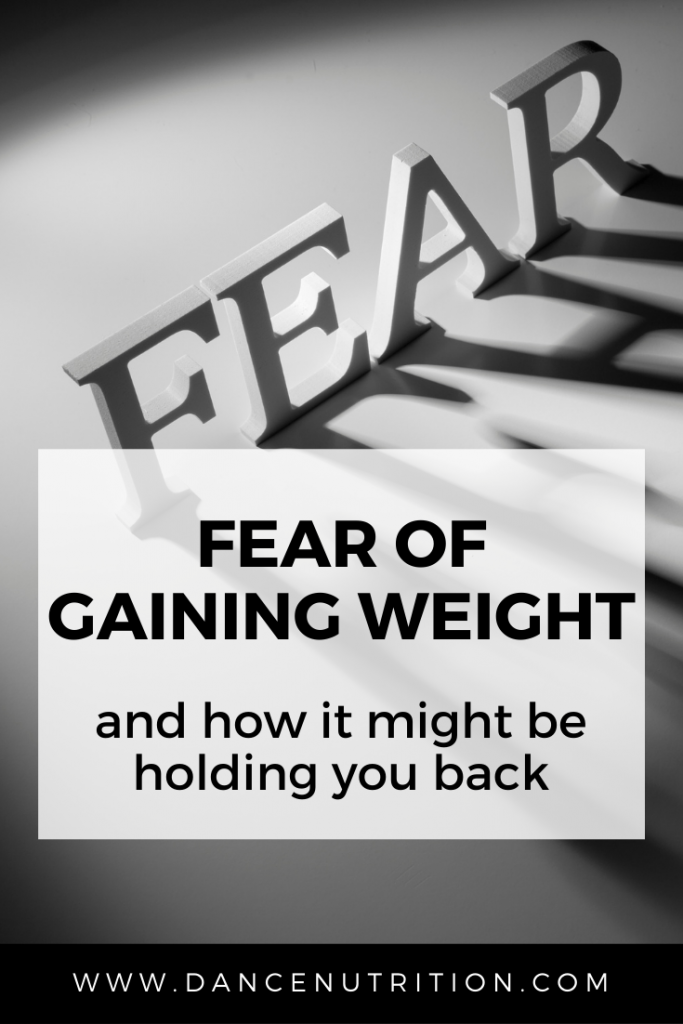In my experience as a licensed dietitian for dancers, I’ve noticed a positive shift: more dancers are recognizing the importance of consistent, adequate fueling. Many are tired of the endless cycle of restriction that eventually leads to feeling out of control around food.
But there’s still one obstacle that holds dancers back from fully embracing a balanced approach: the fear of gaining weight.
Why Dancers Fear Weight Gain
It’s understandable. Dance culture— and society in general— put intense pressure on appearance. Dancers worry about:
- Looking “out of shape”
- Difficulty with partnering
- Fitting into costumes
On a broader level, many worry that weight gain means:
- Poor eating habits
- Reduced attractiveness
- Less success
- Lower value or acceptance
Your Set Point Weight Matters
One of the most important concepts for dancers to understand is set point weight— the range your body naturally gravitates toward when you’re fueling consistently and not restricting.
Though considered a theory, the evidence around set-point weight has been around for decades. It involves the body’s subconscious control over weight— impacting energy intake (via appetite cues) and energy output (desires to move or rest). Many factors impact your body’s set point, including metabolism, growth stage, and past dieting habits.
Dieting often raises your set point over time— it fights to maintain homeostasis by slowing metabolism to conserve energy. This is why dancers need to stop dieting ASAP and instead, lean into resources that encourage adequate nourishment.
What’s My Set Point?
If you’re still growing (under 20), your body hasn’t yet settled into its set point. But even adults should know: trying to manipulate your set point through dieting is rarely successful and often harmful.
If you’re confused about whether or not you’re at your set-point weight, then ask yourself: can I maintain my desired weight without obsessively counting calories and limiting my food intake? Dancers can read more about defining a healthy body weight here.
Fear of Weight Gain: The Biggest Barrier
Fear of weight gain is one of the main reasons dancers struggle to eat adequately. Even when dancers know diets don’t work, they worry:
- What if fueling more changes my body in ways I don’t like?
- What if my career depends on staying thin?
During periods of less training, some dancers gain weight, while others lose or maintain it. If you’ve restricted food for a long time, your body may respond to healing with weight gain.
While these fears can feel overwhelming, remember: obsessing about food and weight won’t make you a stronger dancer. In fact, it pulls energy away from artistry and increases the risk of burnout and injury.
The truth is, an artistic director’s chart, or an arbitrary number on the scale, cannot dictate your “ideal” body weight. No one can predict exactly how your body will respond once it receives consistent, adequate nourishment.
10+ Facts about Dancer Weight Gain
To start building a supportive relationship with food, dancers must address their fear of weight gain. This often involves an active approach to anxiety management (especially over the unknown of how bodies might change) along with navigating body image distress. A few reminders?
- A weight maintained only through restriction is not healthy, no matter what BMI charts say.
- Even if you’re not “underweight,” restricting food to maintain your size is unsustainable.
- You can’t reach your full potential if food and weight worries dominate your mind.
- Fear of weight gain leads to thoughts like: “One snack will ruin everything.”
- Weight changes can bring temporary discomfort, but this can be worked through with support.
- Some peers may comment on changes in your body. This can hurt, but you don’t have to face it alone.
- Many peers won’t notice or care; these are the relationships to focus on.
- If a school or company penalizes you for body changes, that environment may not be supportive of your growth.
- Other schools and companies celebrate performance over appearance— those are the environments to seek out.
- Even if you gain weight, you gain much more: freedom, energy, joy, and resilience.
How To Stop Fearing Weight Gain
Step 1: Validate Your Fear
It’s natural to feel uncertain about how your body might change. But remember: the scale doesn’t measure artistry, bone strength, or muscle power.
Step 2: Reassess Your Values
Your brain is currently running with one thought: if I gain weight, I will be less successful.” Explore what happens when you attempt to micromanage your weight:
- Will you spend your energy counting calories and measuring progress by the scale?
- Will you feel obsessed with numbers?
- Will the scale consume your mood and focus?
Now, imagine freeing up that energy. Could you use it for your artistry, friendships, or personal passions? Questions to reflect on:
- What are your greatest values in life?
- What do you lose when you’re obsessing over calories and weight?
- What do you gain from that obsession— in other words, what needs does it meet?
- How might you get those needs met in other, more positive ways?
- How do you want to spend your limited time on this planet?
Step 3: Rewire Your Thoughts
Affirmations help replace unhelpful thoughts with supportive ones.
- My body deserves to be taken care of with nourishing meals.
- I am a good example to other dancers about how to love their bodies.
- I am learning how to love my body.
- I love delicious food and there is no shame in that.
- I want to treat my body with love and respect.
Once you’ve accumulated your favorites, set reminders: on your phone, in your journal, or on sticky notes. Similar to dancing, repetition is how your brain will re-learn and streamline a more helpful thought process.
Step 4: Shift Your Behaviors
Redirect your focus from weight goals to fueling goals. Practice flexibility, challenge rigid food rules, and apply gentle nutrition once your foundation of consistent eating is solid. Some starting points:
- Support your metabolism with regular meals and snacks.
- Learn the difference between preferences and restrictive rules.
- Use nutrition information to enhance energy and recovery, not as a tool for control.
The Bottom Line
Fear of weight gain can hold you back from the very habits that make you strong, resilient, and joyful as a dancer. Letting go of this fear isn’t easy— it takes practice, support, and patience. But doing so opens the door to more sustainable artistry and a healthier relationship with both food and your body.




